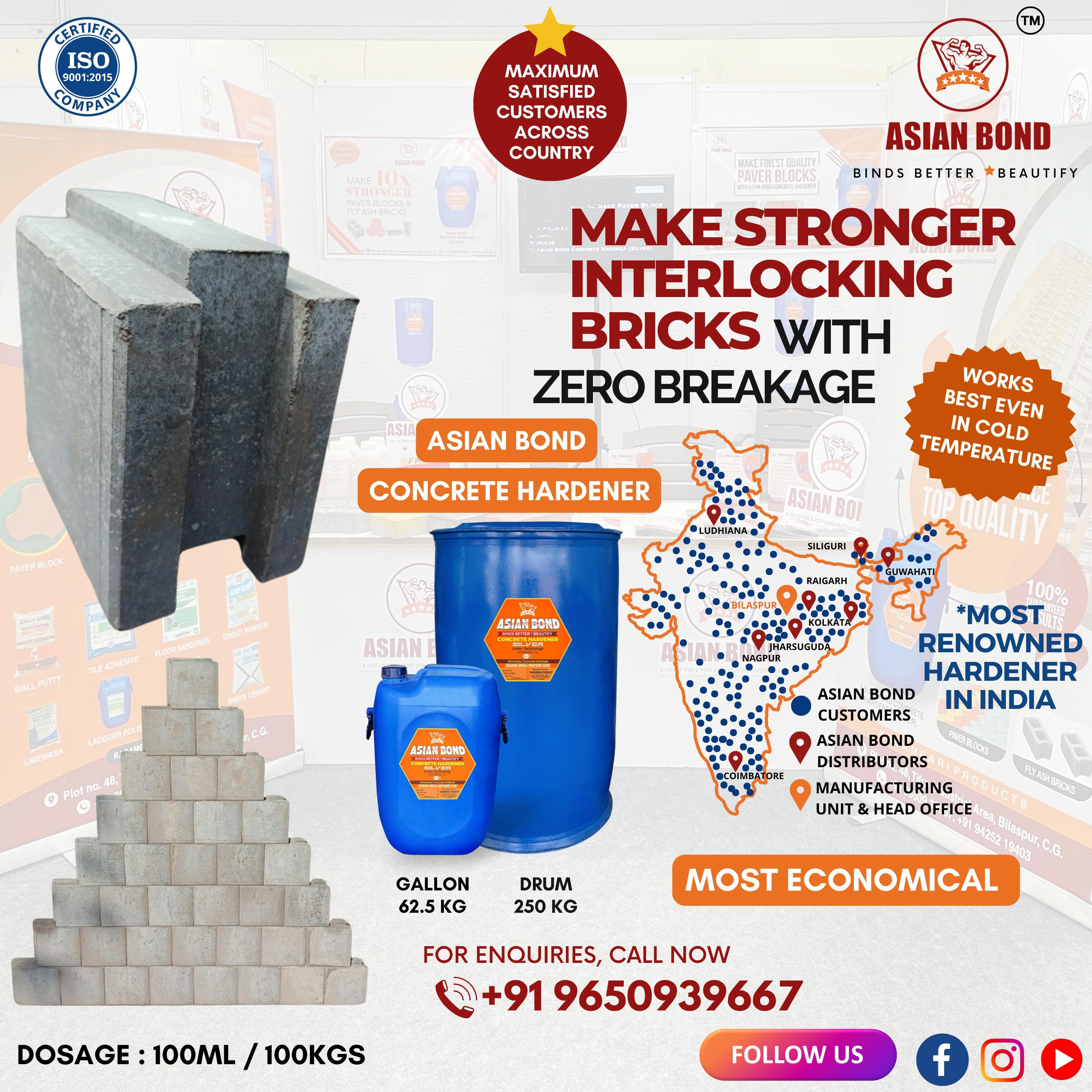The Importance of Monitoring Temperature Differentials in Mass Concrete
In large-scale concrete construction, maintaining structural integrity depends heavily on temperature control. Mass concrete used in dams, bridges, foundations, and industrial floors—generates considerable internal heat during hydration. Without careful monitoring and control, excessive temperature differentials can lead to cracking, durability loss, and higher maintenance costs.
This is where modern construction chemical solutions, including the best concrete hardener in India and advanced temperature control strategies, come together. Leading brands such as Asianbond have introduced high-performance concrete hardener solutions specifically designed for mass concrete projects, ensuring strength, uniformity, and long-lasting performance.
Understanding Mass Concrete and Heat Generation
Mass concrete refers to any volume of concrete large enough that its internal temperature rises significantly due to the heat of cement hydration. As concrete cures, it releases heat—a natural chemical reaction—but when the structure's volume prevents rapid dissipation, internal temperatures can soar.
If the temperature differential between the core and outer surfaces exceeds 20–25°C, tensile stresses develop, leading to surface cracks that may compromise both appearance and structural performance. Engineers must monitor and manage these thermal gradients through a combination of proper mix design, curing methods, and advanced chemical hardener for concrete applications.
Why Temperature Differentials Matter
- Crack Prevention: Large temperature differences create shrinkage cracks that reduce the concrete’s impermeability. Once cracks appear, chlorides or sulfates can penetrate, shortening the structure’s lifespan.
- Improved Structural Strength: Uniform temperature profiles ensure even hydration. Using high-performance modifiers such as the concrete hardener Asianbond maintains cohesion and integrity.
- Enhanced Durability: Controlled thermal conditions ensure dense microstructures. Combined with a floor hardener chemical, this produces wear-resistant, high-performance surfaces.
- Cost Optimization: Repairing thermal cracks is expensive. Using optimized mix designs and Asianbond concrete hardeners delivers long-term cost savings.
Monitoring Temperature Differentials: The Science
Temperature control in mass concrete involves continuous measurement of internal (core) and surface temperatures. Embedded thermocouples or digital sensors record hydration temperatures in real time. When differentials exceed safe limits, engineers intervene using:
- Insulated formworks
- Controlled cooling pipes
- Admixture modification
- Surface curing techniques
Integrating these methods with a chemical hardener for concrete enhances the resilience of large pours. Brands like Asianbond provide surface treatments and admixtures that balance hydration heat, reduce stress, and strengthen surfaces.
Role of Concrete Hardeners in Mass Concrete
Concrete hardeners increase wear resistance, minimize dusting, and form impermeable barriers. When combined with temperature monitoring, they promote uniform surface and internal strength.
- The best concrete hardener in India, such as Asianbond’s formulations, reacts with free lime to create dense crystalline structures.
- Concrete hardener Asianbond penetrates deeply under variable curing conditions—ideal for large foundations and factory floors.
- Specialized versions like concrete hardener for paver blocks deliver extra surface durability and gloss.
The Asianbond Advantage
- Unmatched Quality: Strength, workability, and curing uniformity are engineered into every batch.
- Temperature Stability: Asianbond’s products minimize hydration-related cracks and boost early-age strength.
- Custom Formulations: Options for foundations, industrial floors, and weather-exposed structures.
Construction professionals who buy concrete hardener in bulk from Asianbond gain cost efficiency, reliability, and expert guidance.
Thermal Cracking: Causes and Prevention
- Rapid surface cooling
- High cement content mixes
- Inadequate insulation post-pour
Prevention involves optimized mix designs, gradual cooling, and use of chemical hardeners for surface protection.
- Use low-heat cements and mineral admixtures.
- Apply insulation blankets or water-curing systems.
- Use Asianbond concrete hardener for densification and durability.
- Monitor temperature continuously throughout curing.
Surface Hardening Under Temperature Stress
Surface cracking occurs when heat generation meets rapid ambient cooling. A chemical hardener for concrete reduces permeability and strengthens surface layers, resisting thermal shock.
Asianbond hardeners build dense, micro-structured matrices capable of resisting both chemical and thermal stress—ideal for industrial floors and paver blocks.
Practical Case Study: Industrial Foundation
An industrial complex in central India used Asianbond concrete hardener alongside real-time temperature monitoring. Results included:
- Peak temperature capped at 55°C
- Surface-core differential under 22°C
- No thermal cracking after 14 days
- Improved abrasion resistance due to floor hardener chemical coating
Bulk Procurement for Large Projects
For multi-phase mass concrete operations, Asianbond offers batch-consistent bulk options of chemical hardener for concrete at competitive prices. This ensures performance uniformity and cost efficiency across large-scale pours.
Economic Considerations: Performance vs. Price
While initial cost matters, long-term performance and reduced maintenance are key. Using the best concrete hardener in India delivers:
- Reduced rework and maintenance costs
- Improved surface aesthetics
- Enhanced compatibility with concrete admixtures
Synergy Between Admixtures and Hardeners
Admixtures regulate internal hydration and heat release, while hardeners fortify the surface. Asianbond’s integrated systems ensure both internal stability and external strength.
Sustainable Construction Practices
Sustainability requires energy-efficient, low-emission materials. Asianbond’s eco-friendly concrete hardeners reduce water loss, lower cement usage, and extend concrete life—ideal for green infrastructure.
Integration in Smart Construction
Smart construction combines IoT-based sensors and predictive analytics to monitor curing and advise optimal timing for chemical hardener application. Paired with Asianbond’s innovations, it ensures uniform strength and extended service life in industrial environments.
Choosing the Right Product Mix
Selecting the right combination of admixtures and surface treatments depends on:
- Concrete volume and geometry
- Expected temperature variation
- Structural restraint conditions
- Load and application type
